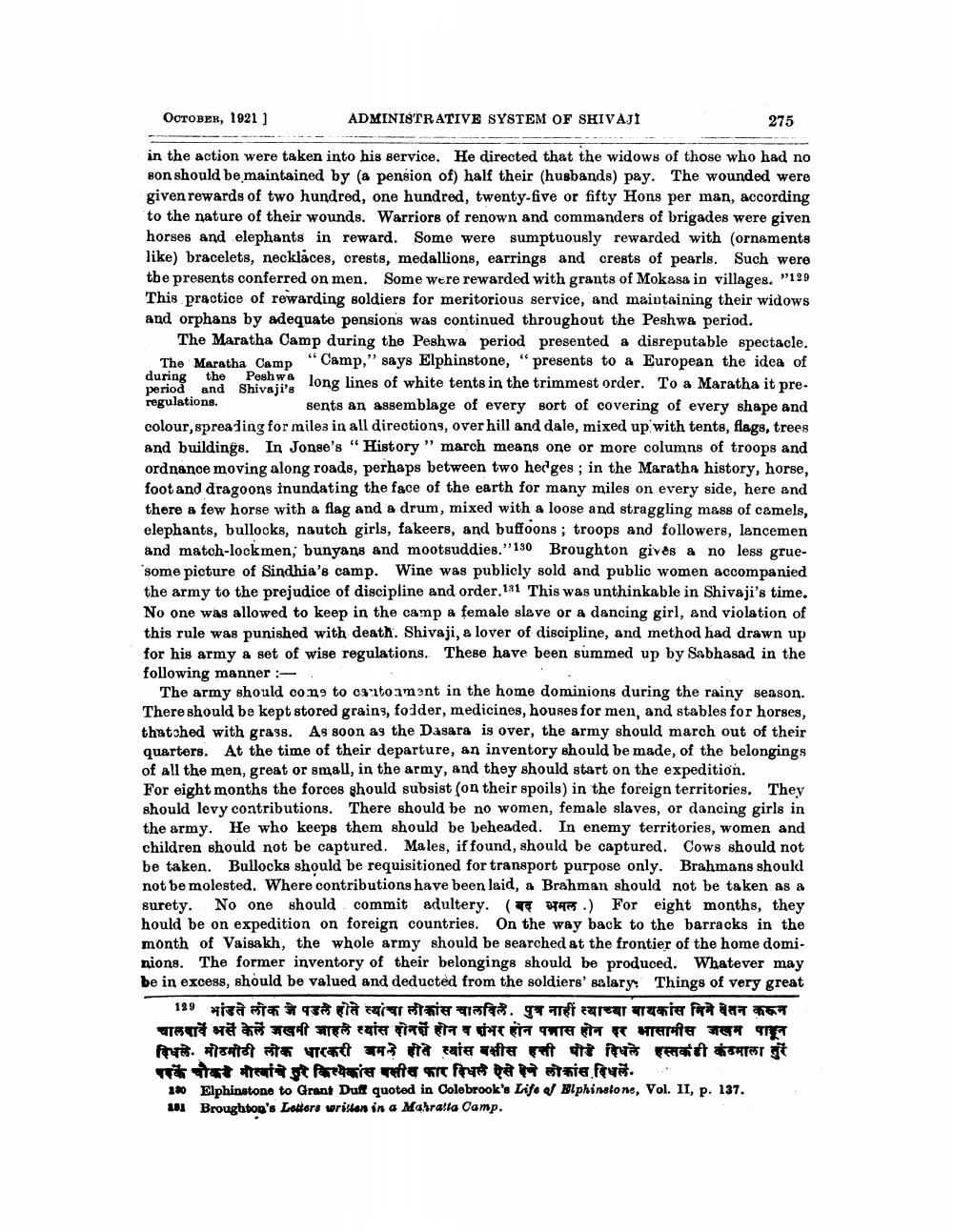________________
OCTOBER, 1921)
ADMINISTRATIVE SYSTEM OF SHIVAJI
275
in the action were taken into his service. He directed that the widows of those who had no son should be maintained by a pension of) half their (husbands) pay. The wounded were given rewards of two hundred, one hundred, twenty-five or fifty Hons per man, according to the nature of their wounds. Warriors of renown and commanders of brigades were given horses and elephants in reward. Some were sumptuously rewarded with (ornaments like) bracelets, necklaces, crests, medallions, earrings and crests of pearls. Such were the presents conferred on men. Some were rewarded with grants of Mokasa in villages. "129 This practice of rewarding soldiers for meritorious service, and maintaining their widows and orphans by adequate pensions was continued throughout the Peshw& period.
The Maratha Camp during the Peshwa period presented a disreputable spectacle. The Maratha Camp "Camp," says Elphinstone, "presents to a European the idea of during the Peshwa long lines of white tento in
shwa long lines of white tents in the trimmest order. To a Maratha it preregulations.
sents an assemblage of every sort of covering of every shape and colour, spreading for miles in all directions, over hill and dale, mixed up with tents, flags, trees and buildings. In Jonge's "History" march means one or more columns of troops and ordnance moving along roads, perhaps between two hedges ; in the Maratha history, horse. foot and dragoons inundating the face of the earth for many miles on every side, here and there a few horse with a flag and a drum, mixed with a loose and straggling mass of camels, elephants, bullocks, nautch girls, fakeers, and buffoons ; troops and followers, lancemen and match-lockmen, bunyans and mootsuddies."'130 Broughton gives a no less gruesome picture of Sindhia's camp. Wine was publicly sold and public women accompanied the army to the prejudice of discipline and order. 131 This was unthinkable in Shivaji's time. No one was allowed to keep in the camp a female slave or a dancing girl, and violation of this rule was punished with death. Shivaji, a lover of discipline, and method had drawn up for his army a set of wise regulations. These have been summed up by Sabhasad in the following manner :
The army should cong to cartoment in the home dominions during the rainy season. There should be kept stored grains, folder, medicines, houses for men, and stables for horses, thatched with grass. As soon as the Dasara is over, the army should march out of their quarters. At the time of their departure, an inventory should be made, of the belongings of all the men, great or small, in the army, and they should start on the expedition. For eight months the forces should subsist on their spoils) in the foreign territories. They should levy contributions. There should be no women, female slaves, or dancing girls in the army. He who keeps them should be beheaded. In enemy territories, women and children should not be captured. Males, if found, should be captured. Cows should not be taken. Bullocks should be requisitioned for transport purpose only. Brahmans should not be molested. Where contributions have been laid, a Brahman should not be taken as a surety. No one should commit adultery. (Top ) Foreight months, they hould be on expedition on foreign countries. On the way back to the barracks in the month of Vaisakh, the whole army should be searched at the frontier of the home dominions. The former inventory of their belongings should be produced. Whatever may be in excess, should be valued and deducted from the soldiers' salary: Things of very great
139 भांडते लोक जे पडले होते त्यांचा लोकांस चालविले. पुत्र नाहीं त्याच्या बायकांस मिमे वेतन करून चालवावे असे केले जखमी जाहले त्यांस दोनशे होन व घंभर होन पन्नास होन हर भासामीस जखम पाडून विधले. मोठमोठी लोक धारकरी बमले होते स्वांस बक्षीस हत्ती घोडे विधले हस्तकंही कंठमाला तुरे परके चौकरे मोत्यांचे तुरे कित्येकांस बक्षीस फार विधले ऐसे देणे लोकांस दिधले.
180 Elphinstone to Grant Duft quoted in Colebrook's Lifo / Elphinstone, Vol. II, p. 137. 10 Broughton's Letters wristen in a Mahralla Camp.




